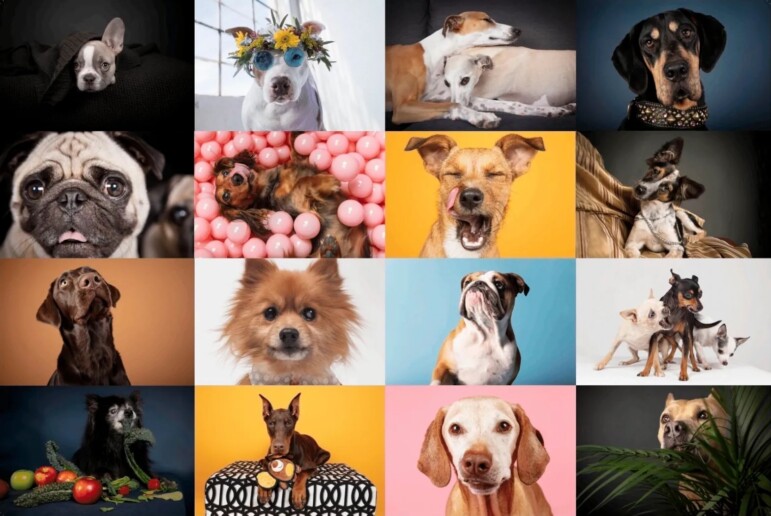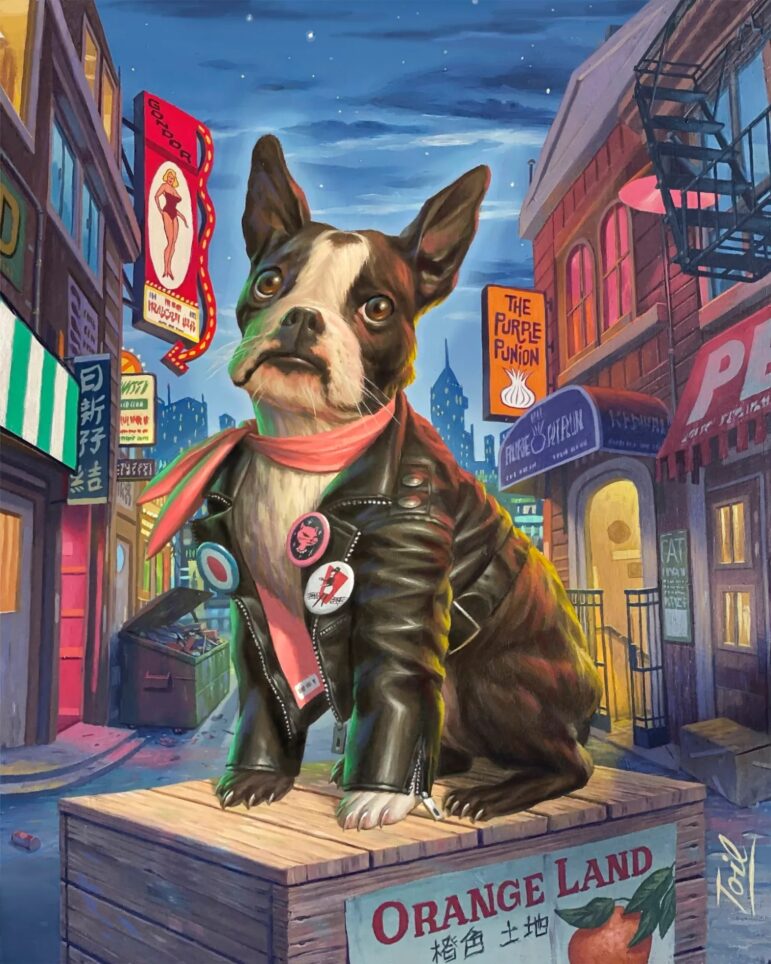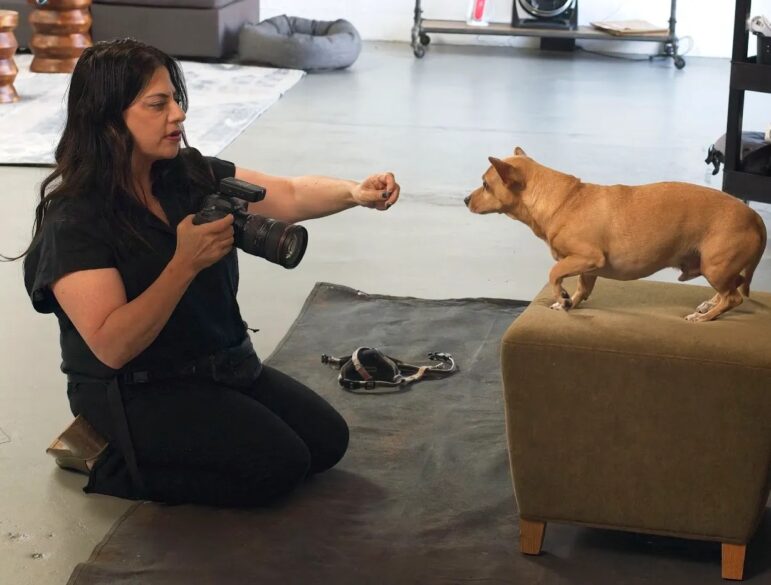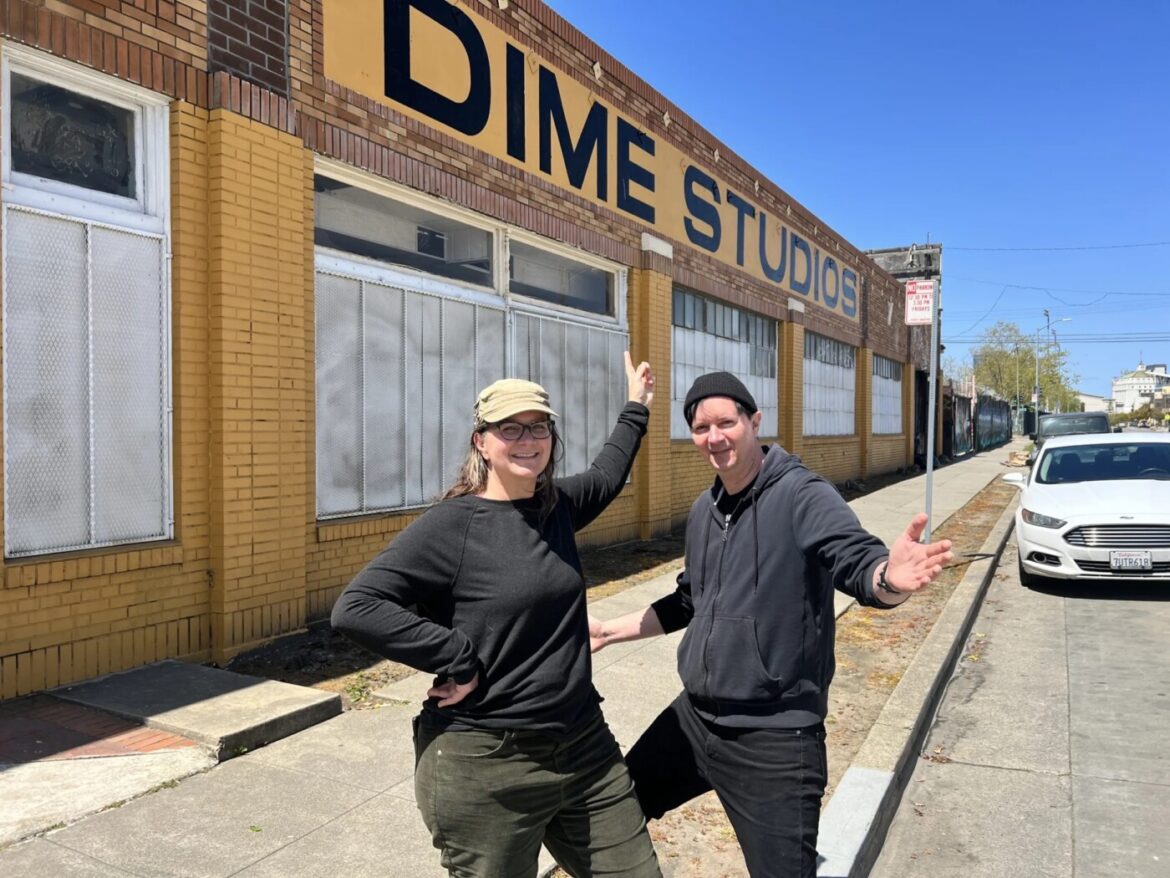A prolific dog photographer. A legendary artist. An animal rescue group that runs on donations. Oakland Puzzle Company is clicking these players into position with a fall campaign that gives jigsaw puzzlers a new challenge and helps animals, too.
Sister-and-brother team DeAnna and Dave Tibbs started Oakland Puzzle Company in May at the Dime Studios building on East Tenth Street. Their motto is “Have Fun. Do Good.” Finding local art for their puzzles is part of the fun. Selling puzzles to benefit community groups and local artists is how they do good.
This fall, they’re selling two dog-themed puzzles that will benefit Rocket Dog, an Oakland animal rescue. One is a collage designed by children’s book author Innosanto Nagara using portraits by Oakland photographer Ellen Shershow, who captures every personality from playful to diva in the collection of pictures.

The second puzzle is an image of the oil painting “Lula Mae” by Oakland artist Brian Clarke, also known as Les Toil.
Clarke has a friend who has lived in San Francisco his whole life who wanted an elaborate painting of the Boston Terrier he adopted a few years ago.
“I offered to do it for the heck of it,” Clarke said. “But I didn’t want to do a plain old straight portrait of her.”
Clarke, taking into account his and his friend’s appreciation for North Beach’s historic Bohemian roots, places Lula Mae in an urban setting that adds complexity and texture to the puzzle. Lula Mae’s soulful brown eyes, pink kerchief and buckle-studded jacket are just a few of the fun details to piece together.
Pre-orders for the puzzles, which sell for $28.95 each, continue until Nov. 15 online at the company’s website.
A different kind of business

The Tibbs are running what DeAnna calls an “alternative charitable business model.” Since cutting and selling their first puzzle, the company has raised more than $10,000 for community groups and artists.
A longtime photographer, DeAnna connects with artists at events, through social media and word of mouth.
“The more people hear about us, the more they tell their artist friends,” she says.
Many stars aligned to create the spark that led to the Oakland Puzzle Company. DeAnna, who loves to solve puzzles, tried making them from her own photographs using web resources. Disappointed by the results, she thought, “What if I could make my own puzzles?”
Then she stumbled on a book called “Start Your Own Small Jigsaw Puzzle Business: Like I Did,” by Kevin Poorman. She saw the possibilities of doing something new and different and looped in her brother.
Just as they started to daydream about a new business, the pandemic hit and the world ground to a halt. They took the next few years to fine-tune a business plan that would allow them to partner with Bay Area artists and benefit community organizations. They found a worker-owned printer, a union shop called Community Printers in Santa Cruz, and launched a Kickstarter campaign that paid for the first round of puzzle-making supplies.
Long-term mission
In a competitive and inventory-heavy industry, the Tibbs’ business model is experimental and evolving, DeAnna says. Talking with DeAnna is like having one foot in the present and one foot in the future.
“Part of our mission is to create manufacturing jobs in Oakland (including for ourselves!),” DeAnna said in an email, “so it will be an ongoing effort to fund all aspects of our mission. We are still establishing a strong base of supporters and returning customers, which we need because our material price points and ability to sustain employees depend on quantity.”

Here’s how the business works: The Tibbs connect with a community partner, which could be a person, group or nonprofit, according to their website. Then they tap their network of artists to find images that represent the community partner’s mission. Sometimes, the Tibbs connect with artists first, and let them select the beneficiary.
Then Oakland Puzzle Company posts a pre-order campaign online.
Community partners receive a percentage of pre-order proceeds and a percentage of total sales when the puzzle is sold afterward. If the community partners own the rights to the image, that will increase the amount of their proceeds. When artists are involved in making the puzzle image, they also receive a percentage of total sales from the pre-order. Artists can donate their proceeds to the community partner if they choose.
Then it’s show time. DeAnna and Dave adhere the “face” or image of the puzzle to the chipboard, cut it, mix the pieces, bag them and put everything in a box. Puzzle enthusiasts will notice the color quality and matte finish of the pieces, DeAnna says.
While the company website is the primary hub for sales for now, customers also can find the puzzles in East Bay stores and Rainbow Grocery in San Francisco.
Growing in Oakland
Early days of the business presented a huge learning curve, DeAnna said. The Tibbs had to learn everything from printing press logistics to die cutter operations. Selecting community partners also was challenging.
Now, for marketing purposes, the puzzle company needs to focus on partners that have a built-in social media following. Once the company develops a larger following of its own, it would like to start benefiting smaller organizations that have more limited resources, DeAnna says.
Six months in, DeAnna says there is so much to be excited about when she comes to work each day.
“To have the dream and the hard work coming into fruition, getting puzzles in peoples’ hands and hearing that people are starting to seek us out is great,” she says. “We’re really starting to see how this business could become a community institution.”
